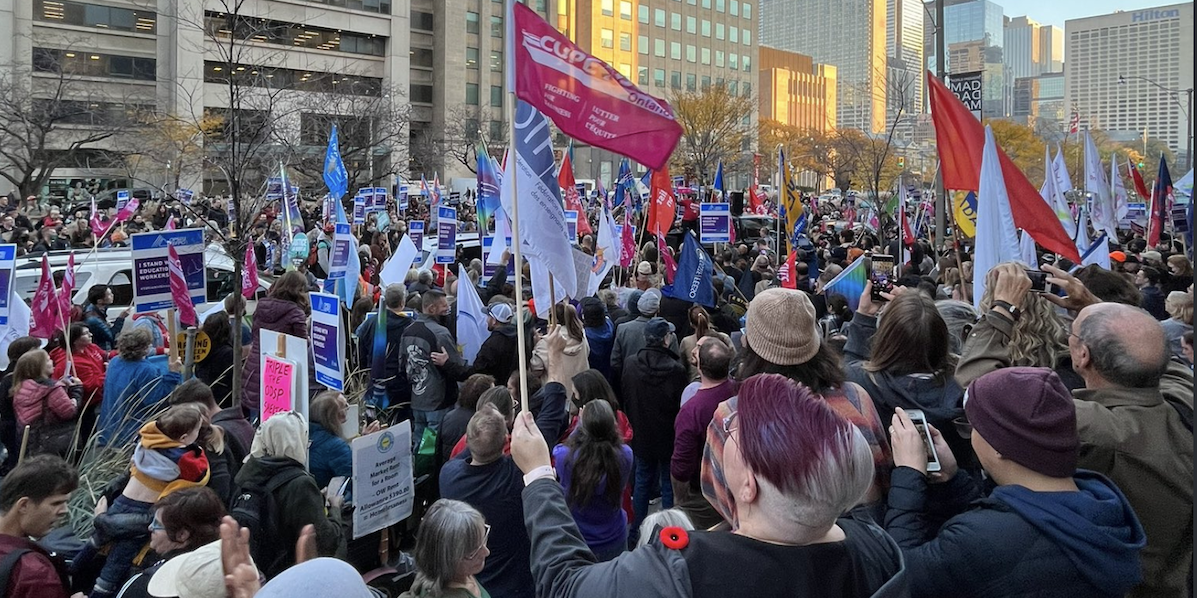The Conservative movement’s vast army of online trolls has been strangely silent about the right of poorly paid Ontario education workers to negotiate a decent salary for themselves.
Funny that, Conservatives being such lovers of Canadian rights and freedoms.
Ditto the right-wing politicians who took coffee and donuts to the thugs who occupied Ottawa and blockaded major border crossings last February while pretending to be the advocates of the little guy and the friends of the working class.
I’m pretty sure their teammate Doug Ford, premier of Ontario, is showing the true colours of the Canadian conservative movement with his plan to use Section 33 of the Canadian Charter of Rights and Freedoms, the notorious Notwithstanding Clause, to impose a poor contract on the 55,000 members of the Canadian Union of Public Employees (CUPE) and strip them of their legal right to strike.
On Sunday, after all, CUPE’s Ontario School Board Council of Unions (OBSCU) gave the statutory five days’ strike notice, after which the educational assistants, custodians, early childhood educators and other workers could have legally walked off the job on Friday.
Everyone knows that’s the moment when the rubber hits the road in contract negotiations and often the best moment for working people forced to deal with a recalcitrant employer to get a fair agreement. That’s why it’s called bargaining.
So, presumably we can now expect continued silence from the likes of federal Conservative Leader Pierre Poilievre and Alberta Premier Danielle Smith, and perhaps adoption of the same strategy later if they are faced with public-sector negotiations in their own jurisdictions. That would be the Conservative way.
As for the foreign-funded “Freedom” convoy crowd, their idea of freedom apparently doesn’t extend to collective bargaining unless it’s them trying to bargain with the Governor General and the Opposition parties to set up an unelected provisional revolutionary government in Ottawa.
I mention this only because sooner or later, probably sooner, the troll army is bound to be unleashed to accuse Prime Minister Justin Trudeau of hypocrisy for expressing reservations about Ford’s plan to use Section 33 to suspend parts of the Canadian Constitution he finds inconvenient after Ottawa used the Emergencies Act to end harassment of citizens, blockades of Canada’s border, and the attempt to overthrow the government.
The difference, which deserves to be analyzed and stated clearly, is that the right to bargain collectively is covered under what we think of as the rule of law, that is, the concept that all people must be treated equally according to the same legal standards.
Whereas, the “right” to occupy cities, harass their citizens, and overthrow democratically elected governments, however unpopular, is not.
Canadian courts have recognized that the right to bargain collectively is part of our constitutionally protected freedom of association. (This seems like a reasonable interpretation of an already recognized right to me, although there are those who would argue it’s an example of busybody judges inventing new rights. But that was always bound to happen, just as immature politicians like Mr. Ford were always sure to abuse it when they became too impatient to let the bargaining process work.)
In other words, the actions of the convoy insurrection defied the rule of law; the right of CUPE members to negotiate an agreement within a codified structure of labour relations defines it.
Our constitution, unfortunately, allows some of our fundamental rights to be suspended for the convenience of governments experiencing authoritarian impulses.
Whether or not this should have been part of the constitution is a subject for debate, but not much else. We’re stuck with the way things are.
Which leads us to the question of what needs to happen next.
Premier Ford did nothing to help Ottawa solve the convoy crisis and plenty to make it worse.
Presumably this was because he saw political advantage in making life difficult for Trudeau and the Liberals in Ottawa. That would explain why he skedaddled to his cottage and wasn’t heard from during the occupation while the Ontario Provincial Police twiddled their thumbs.
Now he wants to suspend the constitution for essentially the same reason: the political consequences of a short legal strike in Ontario’s schools by workers who were never declared to be essential and who made big sacrifices to keep schools open during the pandemic would be politically inconvenient for him and his government.
As a result, perhaps he will end up having to plead with the feds to use the Emergencies Act to end a general strike in Ontario.
That’s unlikely, of course, because many of the unions that would be required to join the brave CUPE workers are likely to find bureaucratic excuses to sit on their hands. Still, their members are pretty mad and yesterday the idea seemed to be gaining momentum.
Once in a while when you pull the cork from a bottle a genie pops out.
Now, wouldn’t it be a fine irony if that were to happen to Doug Ford?
Contributor
AB, ON
Ford should remember: When you uncork a bottle a genie can pop out!
The actions of the convoy insurrection last February defied the rule of law; the right of CUPE members to negotiate an agreement within a codified structure of labour relations defines it.




